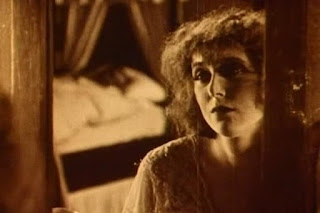Blind Husbands (1919)
Erich von Stroheim's "Blind Husbands"
In 1909, Austrian filmmaker Erich von Stroheim emigrated to America when he was 24 years old. His experiences as a travelling salesman brought him to Hollywood in 1914, where he found work as a stuntman. That year, he was lucky enough to work on the biggest film in the history of cinema, D.W. Griffith's "The Birth of a Nation." He was an extra and horse handler on the production. Because of this work, he was also able to work on Griffith's next project, "Intolerance," this time as an assistant director. After the success of the film, Stroheim went around Hollywood as a swiss army man for productions, as he vacillated between acting, assisting, and technical advising. In 1917, the United States had entered the first World War, and Hollywood began crancking out pro-war, anti-German propoganda films. Stroheim, being of Austrian descent as well as an expert on German military uniforms and paraphemalia, started to be booked as Prussian villians in various productions. By 1918, Stroheim had become a respected actor, as well as a handy production assistant. Because of this, he was given an opportunity to direct his own script by Universal Studios (after he waived his directing fees). The script was called, "The Pinnacle," and centered on a love triangle between a married aristocratic couple and an Austiran officer. The Austrian officer would be played by Stroheim, as he had already cemented his Prussian villian status in the industry.
The film centers on an wealthy American doctor and his wife who travel to the Alps to climb the mountains. At the lodging center, an Austrian Lieutenant attempts to seduce the doctor's wife. When the doctor leaves to assist a local physician, the Lieutenant begins to press the wife until she promises to leave with him, even leaving a note under his door. When the doctor returns, he recruits the Lieutenant to assist him up the mountain. There, he finds the note from his wife in the Lieutentant's pocket. He angrily attacks the Lieutentant and almost kills him. However, he spares him and begins to descend the mountain. Upon his descent, he begins to read the note further, only to discover his wife rejecting the Lieutenant. During his rejoicing, he falls down the mountain and badly injures himself. The doctor is found by soliders, and he instruct them to go back and save the Lietentant's life. However, before they can get back up the mountain, the Lieutenant falls to his death.
When delivering the final film to Universal in 1919, they changed the name of the film from "The Pinnacle" to "Blind Husbands." Stroheim was angry over this change, as the original title was meaningful, and pointed towards the climax of the movie. However, Universal felt that "Blind Husbands" offered a more scathing view of the "aristocratic Americans."
The most important element of the film is nothing from the plot itself or the reception of the film, even. Erich von Stroheim's incredible direction, especially for a debut director, became the most talked about element of the film throughout the years. The seamless way the story is told was quite an achievment for any director, let alone a first-timer. Agnes Smith of the New York Telegraph wrote, "If we are not very much mistaken, "Blind Husbands" will introduce to the industry a new 'super director' - Erich von Stroheim. Unlike many other directors who aspire to the ranks of the fortunate, he is not a near-Griffith, a near-DeMille, or a near-Tourneur. His work is quite in a class by itself. It has individuality and originality. The atmosphere is deeper than mere realism. The details are truly remarkable. The interiors of the Alpine inns, the wayside shrines, and the peasant types were all the work of a man who knew very much what he was doing." Four years prior, D.W. Griffith had invented the language of film syntax with his explosive "The Birth of a Nation." Stroheim, being under Griffith's tutelage for both that film as well as "Intolerance," gave Stroheim the education and process of detail he needed to become a renouned filmmaker. His ability to convey so much simply with camerawork and editing was borrowed directly from Griffith. Film historian Richard Koszarski notes on the psychological complexity that Stroheim borrowed from Griffith, "The very first sequence of the film, as teh three principals travel in the coach to Croce Bianca, announces the arrival of a new master of pyschological realism [in which] Stroheim never hesitates to use Griffith's analytical editing techniques to telegraph certain points directly. A series of close-ups establishes an immediate tension among the travelers, and the attraction of shifting glace to a well-turned ankle is demonstrated with considerable wit...the level of professionalism seen here puts most films of the period to shame, a fact quickly recognized in the first reviews." The characters in the story are complex, displaying both positive and negative qualities. There is no overdirection of the actors, as many can convey quantities of information with simply an expression or look. We can often see what characters are seeing through a shot-reverse-shot, or what they are thinking about via flashback. There is also an innovative use of the change of focus as Stroheim moves attention from one character to another.
"Blind Husbands" was both a critical and commerical success. The film grossed over $325,000 in a year that averaged around $55,000 per film. Both Stroheim and the film itself were hailed as advances in the art form.





Comments
Post a Comment